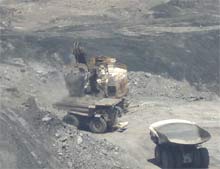China calls for Europe to reject BHP Billiton - Rio Tinto merger
06 October 2008
 Senior steel industry advisor to the Chinese government, Xiaoye Wang, has asked European regulators to reject the proposed takeover of Rio Tinto, the second-largest iron mining company, by mining giant BHP for $170 billion, as it would be detrimental to China, Asia and harm the global economy.
Senior steel industry advisor to the Chinese government, Xiaoye Wang, has asked European regulators to reject the proposed takeover of Rio Tinto, the second-largest iron mining company, by mining giant BHP for $170 billion, as it would be detrimental to China, Asia and harm the global economy.
 Speaking at a conference in Melbourne law school, she said, "In my opinion this merger will have a very bad impact on China, the BHP merger should be reviewed by the Chinese anti-monopoly agency. China is the biggest consumer of iron ore products, and 40 per cent is from Australia. After the merger there will be two competitors only. I believe this is harmful for competition." (See: Chinese competition authorities may reject BHP bid for Rio)
Speaking at a conference in Melbourne law school, she said, "In my opinion this merger will have a very bad impact on China, the BHP merger should be reviewed by the Chinese anti-monopoly agency. China is the biggest consumer of iron ore products, and 40 per cent is from Australia. After the merger there will be two competitors only. I believe this is harmful for competition." (See: Chinese competition authorities may reject BHP bid for Rio)
In July the US anti-trust regulators had given a conditional nod to BHP Billiton's bid for Rio Tinto, and the Australian competition and consumer commission approved the takeover last week (See: BHP's $114 billion bid for Rio gets Australia regulatory nod), leaving the European, Canadian and South African regulators to approve the deal.
The European Union, which has until January 2009 to approve the deal will have a great bearing as some analysts feel that the European regulators will create hurdles to the merger (See: EU warns of tough scrutiny of BHP's takeover of Rio Tinto and EC puts review of BHP's $160 billion bid for Rio on hold; seeks more data)
The Australian approval came amid strong opposition to the merger from international steelmakers from countries like China, Japan and Korea, as a combined BHP Billiton-Rio Tinto company would have too much control over raw material prices, with Chinese steel companies taking the lead as together they import more than a third of global output as they are the world's largest bloc of steel producers.
The Australian regulators deduced that the merger of BHP-Rio would little impact on the global prices nor would it be in a position to influence prices or cut back production to drive prices up as there was adequate alternate supply such as the Australian company 'Fortescue' who has its own ore mine, rail and port development in Australia besides Rio and BHP.
